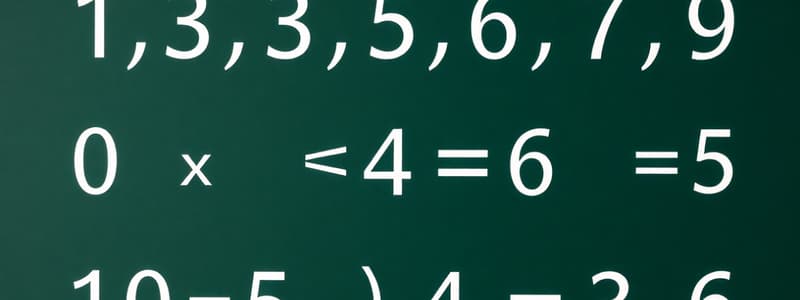Podcast
Questions and Answers
What are the main differences between natural numbers and whole numbers?
What are the main differences between natural numbers and whole numbers?
Natural numbers start from 1 and go upwards, while whole numbers include 0 along with the natural numbers.
Explain the concept of irrational numbers and provide an example.
Explain the concept of irrational numbers and provide an example.
Irrational numbers cannot be expressed as a fraction of two integers; an example is $ rac{ ext{√2}}{1}$.
Describe the commutative property in relation to addition.
Describe the commutative property in relation to addition.
The commutative property states that for addition, $a + b = b + a$, meaning the order of numbers does not affect the sum.
What does the distributive property indicate and how is it represented mathematically?
What does the distributive property indicate and how is it represented mathematically?
How does subtraction differ from addition in terms of number modification?
How does subtraction differ from addition in terms of number modification?
Identify and explain the significance of the associative property in arithmetic.
Identify and explain the significance of the associative property in arithmetic.
What is the role of operators in arithmetic operations, and list the basic operators?
What is the role of operators in arithmetic operations, and list the basic operators?
How do rational numbers differ from irrational numbers?
How do rational numbers differ from irrational numbers?
Flashcards
Natural Numbers
Natural Numbers
Numbers used for counting, starting from 1 and increasing infinitely.
Whole Numbers
Whole Numbers
Numbers used for counting, starting from 0 and increasing infinitely.
Integers
Integers
All positive and negative numbers, including zero. They can be represented on a number line.
Rational Numbers
Rational Numbers
Signup and view all the flashcards
Irrational Numbers
Irrational Numbers
Signup and view all the flashcards
Operators
Operators
Signup and view all the flashcards
Commutative Property
Commutative Property
Signup and view all the flashcards
Associative Property
Associative Property
Signup and view all the flashcards
Study Notes
Arithmetic Modifiers (Operators)
- Arithmetic uses "modifiers" (standardly known as operators, e.g., +, -, ×, ÷) to change the values of numbers.
Number Types
- Natural Numbers: Counting numbers (1, 2, 3, ...).
- Whole Numbers: Non-negative counting numbers (0, 1, 2, 3, ...).
- Integers: Positive and negative whole numbers and zero (-3, -2, -1, 0, 1, 2, 3...).
- Rational Numbers: Numbers that can be expressed as a fraction (p/q) where p and q are integers, and q is not zero (e.g., 1/2, 3/4, -2/5).
- Irrational Numbers: Numbers that cannot be expressed as a fraction and their decimal representations are non-repeating and non-terminating (e.g., √2, π).
Studying That Suits You
Use AI to generate personalized quizzes and flashcards to suit your learning preferences.




